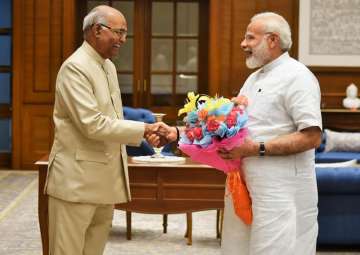Ram Nath Kovind: A dalit face for President or a political masterstroke by PM Narendra Modi?
From the row over Rohith Vemula to the Una incident and the Saharanpur violence, it is the anti-Dalit plank that the opposition parties, particularly the Congress, have used to target the Modi government

Known for springing up surprises as far as his decisions are concerned, Prime Minister Narendra Modi’s choice for the top constitutional post has put his political opponents in quite a spot. The announcement of Ram Nath Kovind’s name as the NDA government’s pick for President of India could serve two immediate political purposes for the Bharatiya Janata Party. For starters, it upsets the opposition’s agenda of targeting the BJP-led government’s alleged anti-Dalit policies. From the row over Rohith Vemula to the Una incident and the Saharanpur violence, it is this very plank that the opposition parties, particularly the Congress, have used to attack the Modi government. At the Jantar Mantar at the height of the Rohith Vemula controversy, senior Congress leaders including Digvijaya Singh, Jitin Prasada, Raj Babbar, Randeep Singh Surjewala, Oscar Fernandes and Selja Kumari attacked Prime Minister Modi and the then HRD Minister Smriti Irani over alleged "atrocities" against Dalits and students and "silencing" their voice of protest in the country.
The run-up to the Uttar Pradesh elections also saw opposition parties target the PM on similar lines. In fact, at the height of the campaign, BSP supremo Mayawati went on to term PM Modi as “anti-dalit man”. Addressing a rally during the fourth phase campaign of Uttar Pradesh Elections 2017, she spelled out the meaning of PM Modi’s name. “Narendra means negative, Damodardas means Dalit, Modi means man. Our PM is anti-Dalit man,” she said. The Una incident also sprung up a similar narrative against the ruling BJP government in Gujarat. Both Congress vice president Rahul Gandhi and the chief of AAP, which was then slated as a major contender to challenge the BJP’s rule in the state, slammed the state government over the incident. Delhi Chief Minister Arvind Kejriwal who played ‘guest’ to the victims’ families, inquiring about their health and the incident, later hit out at the Anandiben Patel-led Gujarat government, accusing it of anti-Dalit propaganda and alleging that the incident had the consent of the State administration. “This (Una thrashing) is not a lone incident; there are many such incidents happening in the state. It happened in presence of police at the police station. It clearly proves that the consent of State administration. Why did the police not stop them?” he had asked.
PM Modi, on his part, has often rejected this contention, claiming that the BJP and the NDA government have been victims of false propaganda by adversaries even though the party has a strong cadre base from marginalised sections and 'non-savarna' classes. "Over 80 per cent of BJP workers are SC, ST and OBC and yet opposition parties have tried to create misconceptions about the party through concerted campaigns,” Modi had said at the end of a day-long BJP national core group meeting at NDMC Hall in Delhi in August last year. While such assertions of the Modi government have quelled this narrative to some extent, it is today’s decision to propose Ram Nath Kovind as President of India that shows its intent to appoint a Dalit man to the top constitutional post in the country which perhaps demolishes the opposition’s agenda completely.
The decision also has a ripple effect. For, not only does the prospect of Ram Nath Kovind, a Dalit man, defeat the opposition’s claims of the government being anti-Dalit, it also puts them in a spot as far as the BJP’s attempts to get a consensus on the presidential candidate are concerned. The foundation for this has already been laid with the BJP appointing a three-member panel including its top ministers Venkaiah Naidu, Rajnath Singh and Arun Jaitley to take up the issue with the opposition. At the meeting with Congress president Sonia Gandhi, Singh and Naidu did not divulge the candidate’s name but did show an intent to garner consensus on the issue. According to BJP president Amit Shah, the Prime Minister has already spoken to Sonia Gandhi and former PM Manhomhan Singh about Ram Nath Kovind’s candidature.
Crucially, the trouble for opposition parties, as well as some of the NDA’s own constituents, will be in rejecting the candidature of a Dalit man for the post of President.
In a country where politics is practiced and built upon caste factors, the prospect of rejecting a candidate from a caste on who’s appeasement many leaders have built their political careers, purely for the sake of opposing the government, can be a tricky matter. The decision definitely puts the Congress, which has been making efforts to formulate a larger alliance to counter the popularity of Narendra Modi and the BJP, in a spot. Putting up a consensus candidate for the post of President against the choice of the government was what Sonia Gandhi had envisaged as a starting point for the anti-BJP alliance ahead of the 2019 Lok Sabha polls.
The stand that the Congress’ own prospective partners, like the JDU among others, on the proposal to have Ram Nath Kovind, a non-controversial and low-profile figure, will potentially determine the path forward for the Congress. At the moment though, Modi’s decision has put the ball right back into the opposition’s court and forced them to take a stand that may well go against their own party foundations, such that could well be rather tough to explain to the electorate.